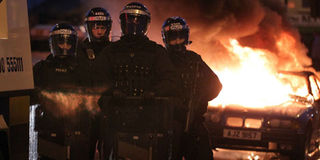N.Ireland leader urges political solution to flag violence

PHOTO | PETER MUHLY Police stand guard with a baton gun and riot shields in front of a burning car left following violence between, loyalists, nationalists and the police in east Belfast, Northern Ireland on January 12, 2013.
What you need to know:
- First Minister Peter Robinson told the rioters that violence would not achieve their aims and that the political process that began with the 1998 Good Friday agreement was the only solution to the problem
- Northern Ireland has been swept with a wave of sometimes violent protests since December 3, when Belfast City Council voted to restrict the number of days the British flag is flown at City Hall to 18 per year
- A 1998 peace agreement brought an end to three decades of sectarian violence between Protestants and Catholics known as the Troubles, but sporadic bomb threats and murders by dissident republicans continue
BELFAST, United Kingdom
Northern Ireland's first minister insisted Sunday that the political process is the only way forward after one of the heaviest days yet of violence over the flying of the British flag.
Twenty-nine police officers were injured Saturday as they used water cannon and plastic bullets to quell the latest in five weeks of protests by pro-British loyalists from the Protestant community.
First Minister Peter Robinson told the rioters that violence would not achieve their aims and that the political process that began with the 1998 Good Friday agreement was the only solution to the problem.
"The only way forward in Northern Ireland is through the political process. It's endorsed overwhelmingly by the people in Northern Ireland," Robinson said on BBC television.
Northern Ireland has been swept with a wave of sometimes violent protests since December 3, when Belfast City Council voted to restrict the number of days the British flag is flown at City Hall to 18 per year.
Loyalists see the council's decision as an attack on their identity as part of the United Kingdom, and an unacceptable concession to republicans seeking a united Ireland.
But Robinson said: "The flag at Belfast City Council is not going to go up because somebody threw a petrol bomb at a policeman.
"The only way forward is through the political process and we are trying to encourage people to engage in that and we are trying to bring forward channels so that we can talk to people on the ground."
Robinson, a unionist, criticised the council's "bad" decision to change the flag rules but said violence was not the answer.
Later on Sunday around 1,000 people attended a peace rally outside Belfast City Hall calling for an end to the violence.
Robinson and his republican deputy Martin McGuinness will join Britain's Northern Ireland Secretary Theresa Villiers and Ireland's deputy prime minister Eamon Gilmore for talks next week on the unrest.
Gilmore said the Irish government was "certainly concerned" about the violence north of the border.
"This street violence has got to stop. Its absolutely wrong that police officers are being attacked," he told Sky News, adding that he would work closely with Robinson, McGuinness and Villiers to help.
"The number of people who are involved are relatively small. The overwhelming majority of people in Northern Ireland and indeed throughout Ireland want the Good Friday and subsequent agreement to succeed."
A 1998 peace agreement brought an end to three decades of sectarian violence between Protestants and Catholics known as the Troubles, but sporadic bomb threats and murders by dissident republicans continue.




